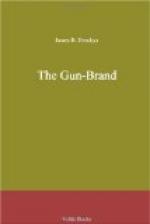Silence enveloped the swamp. An intense, all-pervading stillness, accentuated by the low-hung snow-weighted branches through which the men moved like dark phantoms in the grey half-light of the dawn. They moved not with the stealthy, gliding movement of the Indian, but with the slow caution of trained woodsmen, pausing every few moments to scrutinize their surroundings, and to strain their ears for a sound that would tell them that other lurking forms glided among the silent aisles and vistas of the snow-shrouded swamp. But no sounds came to them through the motionless air, and after an hour of stealthy advance, they drew into the shelter of a huge spruce and peered through the interstices of its snow-laden branches toward the log stockade that Lapierre had thrown across the neck of his lofty peninsula.
Silent and grey and deserted loomed the barrier so cunningly devised as to be almost indistinguishable at a distance of fifty yards. Snow lay upon its top, and vertical ridges of snow clung to the crevices of the upstanding palings.
A half-hour passed, while the two men remained motionless, and then, satisfied that the fort was unoccupied, they stepped cautiously from the shelter of their tree. The next instant, loud and clear, shattering the intense silence with one sharp explosion of sound, rang a shot. And Corporal Ripley, who was following close at the heels of MacNair, staggered, clawed wildly for the butt of his service revolver which protruded from its holster, and, with an imprecation on his lips that ended in an unintelligible snarl, crashed headlong into the snow.
MacNair whirled as if upon a pivot, and with hardly a glance at the prostrate form, dashed over the back-trail with the curious lumbering strides of the man who would hurry on rackets. He had jerked off his heavy mitten at the sound of the shot, and his bared hand clutched firmly the butt of a blue-black automatic. A spruce-branch, suddenly relieved of its snow, sprang upward with a swish, thirty yards away. MacNair fired three times in rapid succession.
There was no answering shot, and he leaped forward, charging directly toward the tree that concealed the hidden foe before the man could reload; for by the roar of its discharge, MacNair knew that the weapon was an old Hudson Bay muzzle-loading smoothbore—a primitive weapon of the old North, but in the hands of an Indian, a weapon of terrible execution at short range, where a roughly moulded bullet or a slug rudely hammered from the solder melted from old tin cans tears its way through the flesh, driven by three fingers of black powder.
Near the tree MacNair found the gun where its owner had hurled it into the snow—found also the tracks of a pair of snowshoes, which headed into the heart of the black spruce swamp. The tracks showed at a glance that the lurking assassin was an Indian, that he was travelling light, and that the chance of running him down was extremely remote. Whereupon MacNair returned his automatic to its holster and bethought himself of Ripley, who was lying back by the stockade with his face buried in the snow.




